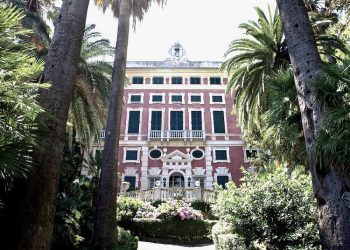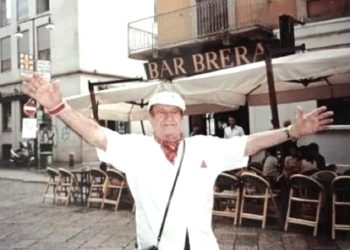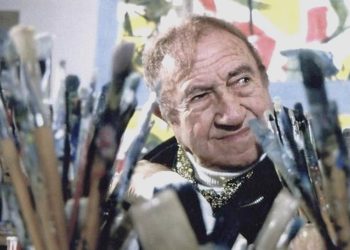Dashnor Kaloçi
Memorie.al publishes some unknown documents extracted from the Central State Archive in Tirana (fund of the former Central Committee of the ALP), which belong to March 1973, where there is an information report compiled by the instructor of the Central Committee of the ALP, Todi Kokoneshi, sent to the assistant of Ramiz Alia, the instructor, Hamit Beqja, regarding the discussions made at the meeting of the basic organization of the Party and that of the collective of the People’s Theater, where were also delegated the Minister of Education and Culture, Thoma Deljana, as well as Fadil Paçrami, the secretary of the Party Committee of the Tirana district that covered art, culture and propaganda. Todi Kokonesh’s full information about his superiors in the Central Committee of the ALP, regarding the problems that concerned that institution of the most important arts and culture, as well as the discussions of some of the most famous actors of the stage and screen, si; Pirro Mani, Naim Frashëri, Kadri Roshi, Sulejman Pitarka, Lazër Filipi, Esma Agolli, etc., with criticism, self-criticism, accusations and denunciations, not only against their colleagues, such as; Pirro Mani, Mihallaq Luarasi and Ali Oseku, but also for the director of the Theater, Bardhyl Kosova and the secretary of the Committee of the Party of Tirana, Fadil Paçrami, etc.
After the speech of Enver Hoxha held on January 9, 1973, in the apparatus of the Presidium of the People’s Assembly where he for the first time criticized the 11th National Song Festival on Radio-Television, which preceded his discussion in the extended meeting of the communists of the apparatus of the Central Committee of the ALP held on March 15 and 16 of that year on the topic: “Fight against foreign and liberal performances and influences in art, culture and literature”, in all institutions cultural and artistic activities of the capital and throughout the country, by order of the Central Committee of the ALP, meetings and analyzes of the basic organizations of the party and the Trade Unions began.
As we will see in many subsequent chapters of this book, one of the cultural and artistic institutions where more meetings and analyzes took place after the speech of Enver Hoxha held in the apparatus of the Presidium of the People’s Assembly and the III Plenum of the Central Committee of At the beginning of 1973, the ALP was the People’s Theater, which meant the great importance given to the senior leadership of the ALP and the official propaganda of that institution, which was also one of the most frequented by the “working masses”. , enlivening the cultural and artistic life in the capital and throughout the country. In this context, the attention of the senior leadership of the ALP was focused on the impact and popularity that the actors of the stage and screen throughout the country had and enjoyed. Even a popularity much more than a part of the top leadership, which was due to the frequent contacts that actors and artists had with the public from the theater stage or the television cinema screen.
From the above, this is also made known by the fact that in the meetings of the basic organization of the People’s Theater party, the senior leadership of the ALP, has sent as delegates two of the main characters covering art and culture (as in party roads as well as on state roads), such as the Minister of Education and Culture, Thoma Deljana and Fadil Paçrami, the secretary of the Tirana Party Committee, a well-known playwright covering the arts and culture, and one of the most popular members of the Central Committee ALP.
In addition to the two senior officials, the meeting of the basic organization of the People’s Theater, which took place in the first days of March 1973, was assisted by Todi Kokoneshi (instructor at the Central Committee of the ALP for art and culture), who has also drafted a report-information for his superiors in the Central Committee. But unlike most of all documents of this nature published in this book and not only, this information has not been seen and initialed either by Enver Hoxha, nor by Ramiz Alia or any of the other secretaries of the Central Committee, as well as the normal practice between them.
But the report-information in question was delegated to Hamit Beqja (Ramiz Alia’s assistant), which seems to have happened due to the great fury of letters addressed to Enver Hoxha and Ramiz Alia, as it is only a matter of days after the issue of the 11th Radio-Television Song Festival had “exploded”. As we will see in the document in question (always according to the instructor, Kokoneshi), the situation in the People’s Theater as during 1972 and onwards until the day that meeting was held, was quite grim, even extremely alarming, which which had made: of the four premieres planned for that year, only one was realized and out of 51 actors that the People’s Theater had, more than half were out of work and were not activated at all.
This is due to the confusion that prevailed there, as well as to the fault of the liberal spirit that prevailed among the directors of the Theater, as well as the staff of that institution. Based on all this, instructor Kokoneshi has reflected in his report-information the discussions of some of the most famous actors, such as: Pirro Mani, Naim Frashëri, Kadri Roshi, Sulejman Pitarka, Lazër Filipi, Esma Agolli, etc., who highlight the contradictions between them.
Likewise, in that meeting it seems that there were also denunciations, such as, for example, the painter Ali Oseku, to which problems were raised that had nothing to do with his work as a painter and decorator, but for the way of life and his pursuit of fashion, as the report states: “He is the first man in Tirana to sew a maxi coat similar to that of Napoleon Bonaparte. This painter has found support from Bardhyl Kosova and Mihallaq Luarasi “.
There would be criticism, accusations and denunciations for Fadil Paçrami and the director of the Theater, Bardhyl Kosova, who seem to be raising the bar and preparing a big storm against them in the coming days and months, which as a result brought even their sentence in the prisons of the communist regime of Enver Hoxha. Like most of the documents published in this book, this one is given in full and without any abbreviations.
Report-information of the apparatus instructor of the Central Committee of the ALP, Todi Kokoneshi, regarding the problems in the People’s Theater
I N F O R M A T I O N
ON THE MEETING OF THE BASIC ORGANIZATION FOR ACCOUNTING AND ELECTIONS IN THE POPULAR THEATER
I attended the meeting of the basic organization for accountability and elections at the People’s Theater, as well as the meetings of the collective of this theater, when Comrade Enver’s speech was delivered at the Presidium of the People’s Assembly and at the III Plenum of the Central Committee. Comrade Thoma Deljana assisted as a delegate at the meeting of the organization. Comrade Fadil Paçrami also participated.
The report given at the basic organization meeting was pervasive on many issues, without analysis, and lacked the spirit of criticism and self-criticism. But what was not done by the report was well complemented by the lively discussions made by the vast majority of communists. They analyzed their work and the work of the organization with a high sense of responsibility, criticized for shyness and the great weaknesses that exist in their institution and some foreign performances that have been manifested there.
From the discussions that took place in the meeting of the basic organization for accountability and elections and in the meeting of the collective, the following issues were raised:
- It was pointed out by everyone that in the People’s Theater there are significant shortcomings in the organization of work, there is fragmentation and liberalism. All the actors and actresses who discussed strongly emphasized that they are not in charge of work, we have fallen, they said, into a sloth of laziness, about which we have often raised our voices but are not being heard.
The People’s Theater employs 51 actors, but usually half of them are active and the other half is almost out of work. No work is organized to work in parallel to prepare the two parts and give them at the same time, for example, one part could give performances in Tirana and the other in the village or in other districts of the country. Some of the old actors who are old and can no longer give, as well as some untalented young people are almost completely out of work. The unanimous opinion was expressed that measures should be taken to settle them elsewhere.
Many parts of the repertoire prepared years ago remain dead, no measures are taken to renew them and reappear them to the public. Although it has been decided that in all parts the main roles will be duplicated, no organized work is done in this direction. As a result, many parts where the artists who are ill today or have left have been removed from the repertoire. And they try to justify this lack of organization by theorizing in a crooked way that ostensibly some of these roles cannot be duplicated, because they cannot be achieved by other actors, thus feeding the sick sedation of some artists.
While life has proved the opposite. When organizational measures were taken, two roles that for a year were discussed that could not be duplicated by other actors, were well prepared within two days. For this it was emphasized that there should be more organization by the directorate itself, but also more struggle by the actors themselves. The communist Lazër Filipi pointed out that he had proposed to the director Pirro Mani the desire to duplicate the role of Viktor Gjoka in “The Second Face”, in order for this beautiful drama to re-enter the repertoire of the Theater. But Pirro Mani had refused by telling him that ay could not fulfill that role. But the actor Lazër Filipi rightly insisted and prepared it himself in a completely independent way so much that he convinced the collective and the director that he could interpret it with dignity.
The People’s Theater is very bad with the repertoire, it currently has only three parts left and these are consumed. At the meeting it turned out that there are all possibilities that within a short time, some of the most dignified parts of the old repertoire of the People’s Theater will be revived, such as: “The fisherman’s family”, “Our land”, “On the ruins”, “Seven Shaljans ”,“ Kremlin Hours ”etc.
The whole preoccupation of the directorate was said in the organization is to correct the plan that is supposedly big, at a time when no organizational measures are taken to engage the whole body at work. We have discussed and approved the plan, they say, it is so feasible, but there is no fight to realize it. As a result of these weaknesses for 1972 113 performances were not realized, and for the first two months of this year they have a deficit of 22 performances. So the beginning of this year is bad.
Both in the organization and in the collective, the fact that only one premiere was prepared for the whole of 1972 was severely criticized, out of four that were the plan and out of five that were prepared for 1971. For the preparation of the part “The General of the Dead Army”, it took 6 months, as well as for the drama “Orpheus goes down to hell”, when there were all the opportunities to prepare for no more than 2-3 months each. This is such a big deal, said the communist Tefi Pali, who has no other theater in the world. For the preparation of the parts and for the work in general it was said to set the norm and not to remain in the power of the directors. The biggest concern was that for 1973, no organized work was being done to prepare the new parts. The repertoire has not been specified yet.
Many discussants pointed out that the theater lacks control and discipline at work. It used to be the rule that every show must be assisted by a director or an assistant. Now they have abandoned this rule and quite unpleasant things have happened. Laughter has been caused several times on stage. In the last days in the drama “A short winter”, in its most culminating part, one of the actors distorting the text, used such banal words which are misleading and caused laughter from all the other actors. And the bad thing is that these do not become a problem and are easily passed over.
Both in the organization and in the collective, it was emphasized that in successfully fighting against the manifestations of conservatism, the Party’s message to fight on both sides, both against conservatism and against liberalism, has not been heeded.
- Even in the Theater, a whole opinion was elaborated that we should not lag behind the world, we should walk with time, etc., and with this the imitations from others were justified. The aim was to denigrate our Theater, its many years of experience and to fetishize the successes achieved in the last two or three years. Comrade Fadil Paçrami was criticized for calling the People’s Theater, “Bogdani” theater.
Communists Naim Frashëri and Esma Agolli, developing this idea emphasized that even the most untalented actors from the young, felt warmer and more confident than the most talented actors from the old. The old actors began to denigrate, they said, to be called squeezed lemons. By stunt, everyone was fired as a lecturer at the Higher Institute of Arts, under the false pretext that the directorate of the People’s Theater does not allow it. The old actors were actually quarantined pointed out some of the discussants.
The conservative epithet given to those who raised their voices was like a means to silence you. But in order to present ourselves as young and modern, said the actor Sulejman Pitarka, we started to leave and favorites, although we were convinced that they did not suit us.
In the organization and in the collective it arose that by rightly fighting against the declamation in the acting interpretation, it was passed to the other extreme in simplification. The tendency was to present the actor as icy, Nordic, without feelings, without temperament, having nothing in common with the Albanian character.
Foreign performances have also appeared in an attempt to have more directorial effects which became an end in themselves, to the detriment of the ideas of the piece. Thus, for example, there has been the occasional and inappropriate use of pistols, the use of dark and dim lights, lunch turns into dinner, the actor is put in the dark, he is not given the opportunity to communicate directly with the spectators not only through speech but also with its own mimicry and temperament.
The most prominent were the foreign influences in the decor which in some parts such as: “Events of 1961”, “A piece of road”, “Orpheus goes down to hell”, etc., is not put in function of the part at all, but is constructed as an end in itself. The mania of podium mania and scale mania has spread, for which large expenses are made and they serve nothing. In the decor of the part “Events of 1961”, it was said in the organization, there is no Albanian element. Rather it has an extravagant decor. A three-legged table is set on stage; journalists are dressed as cowboys like carnivals, and so on. Often times the decor becomes heavy and impossible to play in other scenes of our country.
The spread of this extravagant decor was said to have been greatly influenced by a painter of the Opera and Ballet Theater, Ali Oseku, who has been used several times by the People’s Theater, around whom a halo has been created as a very talented man. He is the first man in Tirana to sew a maxi coat similar to that of Napoleon Bonaparte. This painter has found support from Bardhyl Kosova and Mihallaq Luarasi.
In the organization and in the collective it was emphasized that for these things there were many remarks from communists and actors without parties, but these were not taken into account at all that they were allegedly made by people without culture. In this institution was cultivated the opinion that for the problems of the Theater, only 3-4 people can help, while nothing can be expected from the others. Those who decided on everything were: Mihallaq Luarasi, Bardhyl Kosova, Pirro Mani and Ali Oseku. Based on such concepts, the repertoire, decor, etc., are often not discussed at all in the artistic council, although such a rule has been established in time.
Both in the grassroots organization and in the collective, many concerns emerged about the repertoire. Everyone was of the opinion that the precedent should be given to parts of the national dramaturgy. The tendency of some directors and actors to devote more work to foreign parts and less to national ones was criticized. In this regard, the unfair pricing policy was also criticized. All actors have been nominated in foreign parts and almost none in national parts. Criticism was also leveled at the authors for going with a higher artistic level than so far, they generally stay below the Theater level.
By some discussants the concern was shown not to go back to the other extreme of removing all foreign parts. Discussing this issue, the communist Lazër Filipi said that: the orientations of the Central Committee and Comrade Enver are very clear, but I do not understand why they are confused in the middle and basic instances. Developing the same idea, Kadri Rroshi stressed that bureaucratization in us, lies in the mania to be inside, but this is inhibitory.
The district party committee was criticized for having to deal with the problems better. For the premiere of “Orpheus goes down to hell”, the artistic council, after discussing it, was of the opinion that it should be shown to the public. Whereas the Party Committee (comrade Fadil), had called the director and told him that now it is not an opportunity to give this show. It was said that this answer is not fair at all. If the piece has flaws that are not worth giving, then argue in the artistic council in order to draw lessons from these mistakes.
- Communist Bardhyl Kosova was widely criticized both in the organization and in the collective. He was criticized as a sluggish, inactive, indifferent, scholastic man who supported the so-called “innovators”. He was especially criticized for major shortcomings in running the work. Comrade Bardhyl’s discussion was one of the weakest and by no means self-critical. I may be in a hurry, but I got the impression that he does not have the right skills (especially organizational skills) to lead that important institution. I think there is a need for a prepared and temperamental staff.
- In the basic organization of the Theater there are bad relations between some communists and manifestations of lack of unity. Such demonstrations took place in the basic organization of the party between the director Bardhyl Kosova and the secretary of the basic organization, Naim Frashëri, as well as among some other communists. Although these have been discussed and claimed to have been flattened, in fact they exist. Often time’s problems are not addressed in the organization, but discussed more outside it.
An important measure to cope with this situation would be the acceptance of new elements in the Party. There are such elements but so far nothing has been done. The age of communists is over 42 years.
Finally, I discuss Comrade Fadil. He told the organization that he had come to make self-criticism, for some criticism that has been made in his address. I may be subjective, but I got the impression that Comrade Fadil’s self-criticism was schematic and shallow; there was no analysis to explain the causes of these mistakes. /Memorie.al
Tirana, on 8.III.1973
Todi Kokoneshi






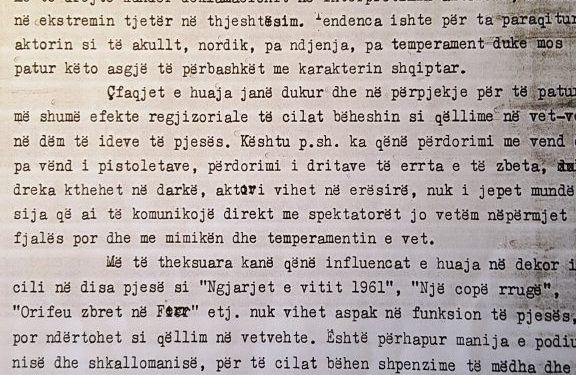
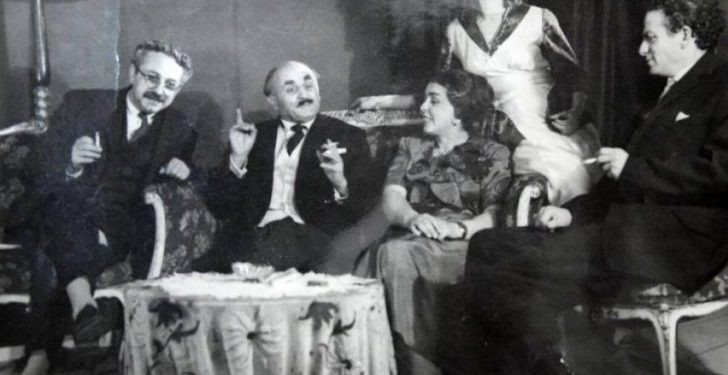

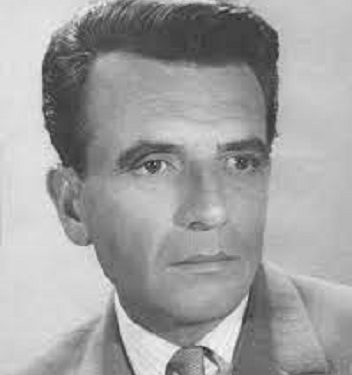
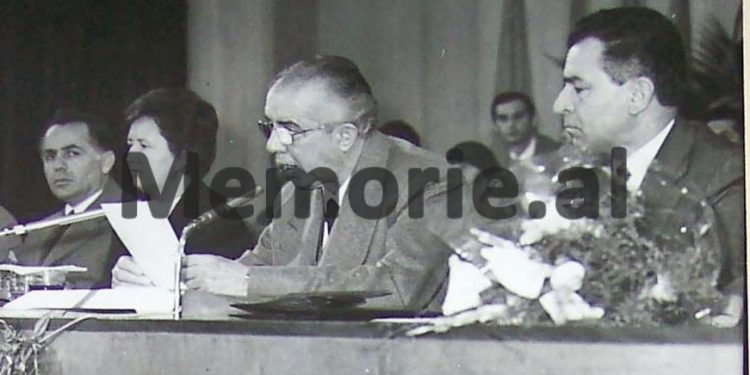
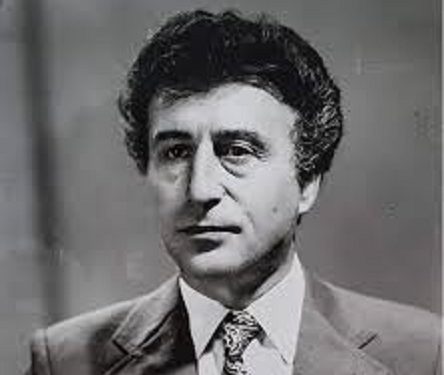
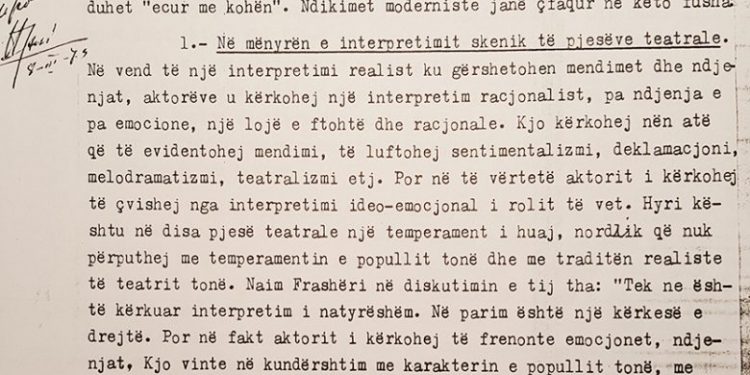
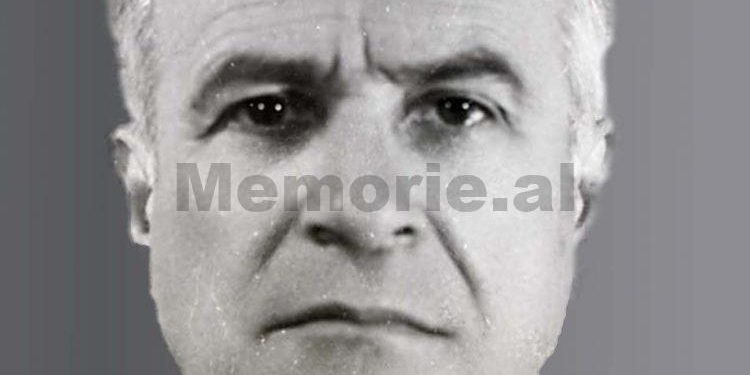
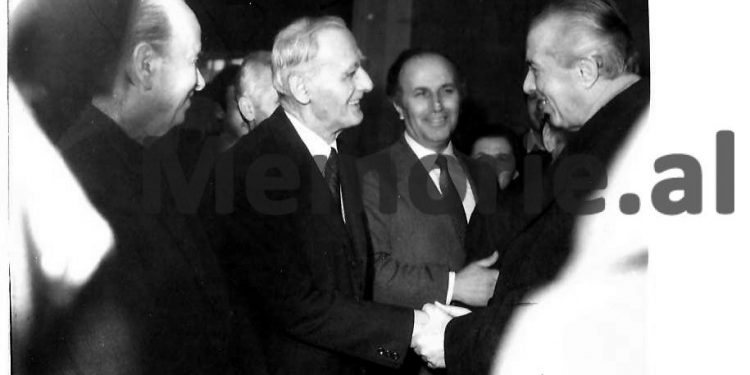

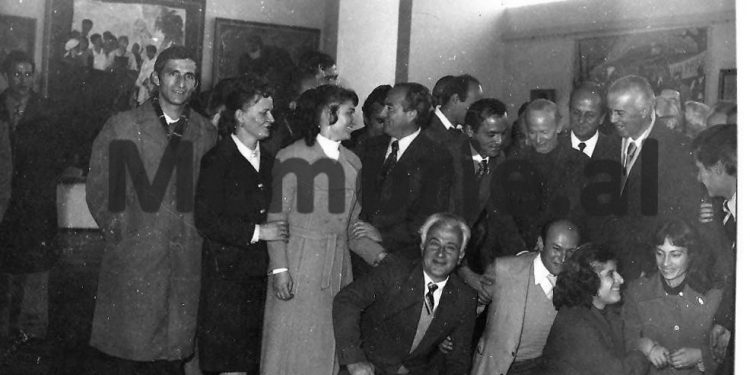
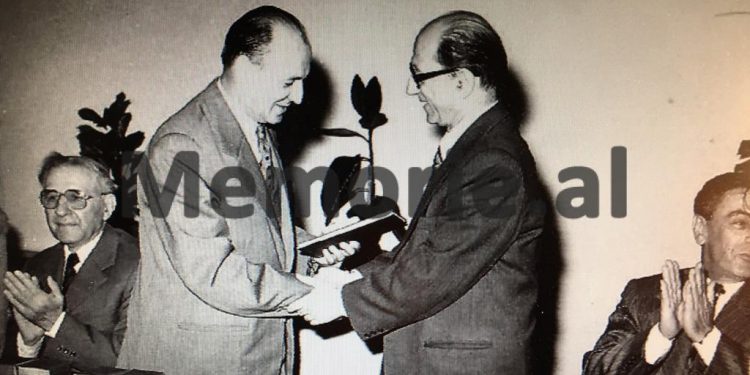
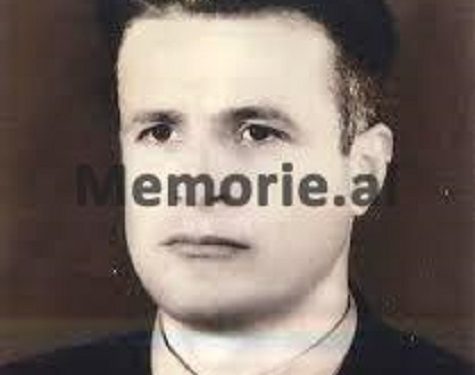
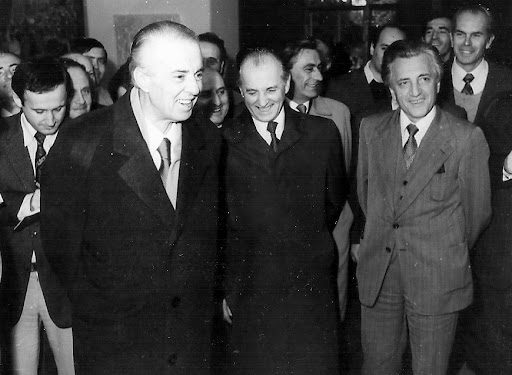
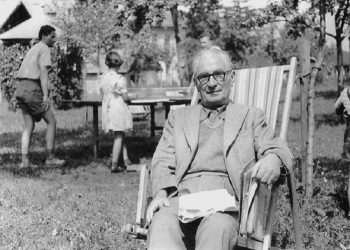

![“Count Durazzo and Mozart discussed this piece, as a few years prior he had attempted to stage it in the Theaters of Vienna; he even [discussed it] with Rousseau…” / The unknown history of the famous Durazzo family.](https://memorie.al/wp-content/uploads/2026/02/collagemozart_Durazzo-2-350x250.jpg)
